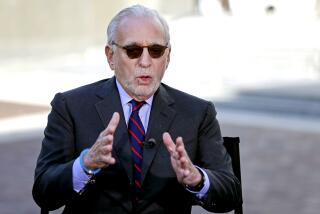ICN Board Majority Goes to Dissidents
- Share via
A record first quarter for ICN Pharmaceuticals Inc. apparently was not enough to preserve the influence of mercurial Chief Executive Milan Panic on Wednesday as dissident shareholders gave Panic’s opponents a clear majority on the company’s board of directors.
The ICN board, which is being downsized from 12 to nine members, will include six members who have strongly questioned Panic’s stewardship of the company he founded 42 years ago. The new board is expected to move quickly to oust Panic as CEO.
A bitter and expensive proxy fight had pitted three ICN- preferred board candidates against a slate of outsiders nominated by Franklin Mutual Advisers and Iridian Asset Management, two investor groups that together hold more than 10% of the Costa Mesa drug maker’s stock. Three other dissidents had been elected to the ICN board last year.
Although ICN will not formally release the results of the proxy fight until they have been certified, the company all but conceded at a shareholders meeting that Panic had lost what was probably his last battle to maintain control of the company.
“I think you can assume from the comments [made at the meeting] that we are losing,” said Alan F. Charles, executive vice president for corporate relations at ICN.
Franklin Mutual Advisers and Iridian Asset Management claimed victory in a statement released after the meeting. Sources at the meeting said voting shareholders had favored the opposing slate of candidates by a 3-to-1 margin.
“The shareholders of ICN, in an extraordinary show of support for our efforts and our slate, have delivered the clearest and most direct message possible of their profound unhappiness with the status quo at ICN,” Franklin and Iridian said.
In an hourlong speech at the shareholders meeting, Panic was unclear about how he would accept the vote, alternately rattling his saber and extending an olive branch for “an orderly transition.”
At another point, Panic said he would “viciously and vigorously defend if anything [negative] affects this company.”
Through the years, Panic has survived government investigations, sexual harassment accusations and attempts by shareholders to limit his power.
Analysts predicted that the new board majority would accelerate the push for breaking ICN into three companies, a process that began this year with the initial public offering of its Ribapharm Inc. unit.
Observers differed on whether the proxy fight had larger implications for the pharmaceutical industry or other businesses.
“This is a unique case because Panic is unique,” said Arnhold & S. Bleichroeder analyst Richard R. Stover, who did not view the board changes positively. “You knew where things were going with Panic. With these new board members, who knows?”
Fariba Ghodsian, managing director and head of health-care research for Roth Capital Partners, disagreed, noting: “It will provide more independent thinking for the company.”
But Bruce Goldfarb, senior managing director and general counsel to Georgeson Shareholder Communications Inc., a proxy firm that has represented both company interests and those of dissidents in proxy fights, called the board battle a sign that shareholders in general have decided to make their interests and influence known, rather than just sell shares when they disagree with board or company policies.
“There is no shame in speaking up and expressing your doubts in this post-Enron environment,” Goldfarb said, referring to the energy trader whose collapse left shareholders holding near- worthless stock.
Panic drew fresh criticism from dissidents last month when he was awarded a $33.1-million bonus for his role in the recent spinoff of Ribapharm.
ICN representatives said Panic did not receive stock in Ribapharm. Instead, the board awarded the cash bonus to Panic, along with bonuses totaling about $17 million to 12 other executives and directors.
ICN had reported a 60% jump in first-quarter net income as royalties more than doubled for its biggest product, the hepatitis C drug ribavirin.
The drug maker, which also sells antibiotics, sedatives, vitamins and cosmetic lasers, earned 40 cents a share, beating Wall Street estimates averaging 36 cents.
Panic said he expected second-quarter earnings to exceed Wall Street estimates of 43 cents a share.
On the day, ICN shares fell 15 cents to $27.80 on the New York Stock Exchange.
More to Read
Inside the business of entertainment
The Wide Shot brings you news, analysis and insights on everything from streaming wars to production — and what it all means for the future.
You may occasionally receive promotional content from the Los Angeles Times.











